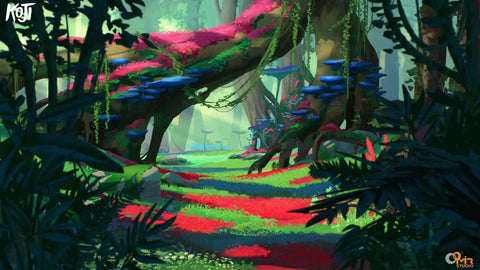written by J. T. M. Sharp
To say "this world is alive" is true in at least three different senses. First, I am alive and I am part of this world. Thus, at least some subset of the world is alive. That's the trivial sense that is always true by definition. Second, qualities pervade the world, and with them a kind of primitive consciousness, down to the smallest particle. If you want to call that alive, call it alive. I do, though some people have a problem with it. It's fun to think about--but still, this sense is not the one to which I refer.

My keister is currently parked on a small planet in the constellation of Musca. I can't give you a better estimation of its location because, of course, I don't know quite where it is. Our Hofstadter drive malfunctioned mid-warp, we got thrown out when the bubble clipped a stellar gravity well. I never heard so many alarms blaring in my life, Tina. One of them was attached to the radiation shielding, which sheared off and hurtled away into the inky dark. We had to surface. It was a miracle that there was a rocky planet nearby, much less a habitable one with an ozone layer. We would have fried while we were awaiting rescue otherwise.
I input the coordinates and Patchy and I hobbled our way sublight. It took seventy-two hours to reach the surface and the hermetic seals on the entryways were already burnt away by the time we made touchdown in a relatively less dense patch of vegetation. That's why we didn't bother with containment procedures before securing the area: we'd already cross-contaminated.
I've seen alien landscapes before. One time we surfaced on a frost-filled rock where the mountains and cities flickered in and out of existence. But nothing prepared me for what I saw when the hatch opened and the sun filtered in through the forking vines tall as trees. There were people hanging like fruit from their branches, people from all over, every kind of person I'd ever seen, Alterran, Sheliac, Varna, Earthling, whatever. The vines entered at the upper back and were woody enough to support their full weight. They hung around the ship like orchids (or Christmas lights, as Patchy would later describe.) And this was only the clearest bit of surface we'd been able to find. Patchy and I exchanged glances of discomfiture.

Warily I walked to a low-hanging man to examine more closely. His skin was pale and his lips were wet. His eyes remained closed and his breath turned to steam in the frosty air. Apart from the branch extruding from his upper back, he appeared as a perfectly normal and healthy human being, perhaps in his early thirties, brown hair, long beard, and who knows what color eyes. I wasn't about to disturb his rest. The expression on his face was both placid and content.
In fact, nothing we did seemed to disturb their slumber. It is a planet of sleeping billions. We did later scans with our sparse medical equipment, which revealed normal human internals. Our genome sequencer, which had been sold to us along with the ship, turned out to be non-functional as soon as we thought of processing samples.
There was quite a debate yesterday between myself and Patchy about the humanity of these creatures. He figured: alien planet, growing from a weird globe-spanning mycelium, alien life forms Q.E.D. I wasn't so sure. They look human enough to me. I wasn't willing to discount that some other vineless people have been here before us, even planted the seedling.

The latter still remains a distinct possibility, but Patchy and I are now in agreement about their inhumanity. Having been stranded here for six months now, we have watched their pitiful faces and bodies age at a hundred times the rate of us. The man who appeared roughly thirty when we surfaced now appeared to be a hirsute gentleman in his late fifties. The content expression of his dreaming had creased wrinkles from his grin to his crow's feet. He looked as one who had lived a full and happy life.
It was only the next day that they began to drop from the vines.

Leave a comment